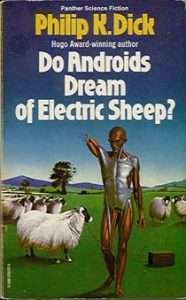One of the fun things about re-reading golden age sci-fi novels is seeing how their predictions compare to reality now that we’re coming upon the dates in which those books are set. Philip K. Dick’s “Do Androids Dream of Electric Sheep?” (1968) is of interest now because of the recent theatrical release of the “Blade Runner” sequel and because its fictional date of 2021 isn’t far away.
A squalor of plenty
There are many things in the book that ring true about living in 2017, but at first glance, “DADOES” portrays a bleaker world. The urban living experience in PKD’s book is quite different from reality, as the two protagonists, Rick Deckard and John Isidore (both sad sacks in the classic PKD mold), live in San Francisco apartment buildings that are mostly abandoned; Isidore, in fact, is the sole tenant of his building when we meet him.
Most of humanity has emigrated to Mars in the wake of World War Terminus, which presumably ended with nuclear bombs. Deckard stays on Earth because of his job as a bounty hunter of androids who killed and escaped their rich owners on Mars. Isidore is a “special,” a mentally addled person who is not allowed to emigrate because he’s too contaminated by the post-war dust.

“Do Androids Dream of Electric Sheep?” (1968)
Author: Philip K. Dick
Genre: Science fiction
Setting: Future of 2021, San Francisco
In a way, Deckard (along with his wife, Iran) and Isidore live in a squalor of plenty. It’s implied that they can choose any apartment they wish, as the property owners have abandoned them. The plumbing, heating/cooling and electricity are in working order. Isidore can find enough functional furniture in his building of 1,000 apartments for himself and new neighbor Pris Stratton, although he notes that a lot of it has turned into “kipple,” the book’s term for junk or useless ephemera that takes up space.
Isidore’s TV works fine, too. Although it only pulls in the Government Channel, that’s OK because he only wants to watch “Buster Friendly and His Friendly Friends” anyway. The common man doesn’t remember or care who “won” WWT.
But whether the U.S. government was on the winning or losing side, it does run a totalitarian state – albeit one that is itself turning to metaphoric kipple. Isidore buys “blackmarket” food (page 127 of the paperback), something PKD notes in an offhand manner that suggests federal agents don’t bother enforcing grocery regulations any more than they arrest squatters.
Duopoly arguments
When a reader pulls back from the details and looks at “DADOES” with a wider lens, they’ll see parallels to the real 2017. Government propagandist Buster Friendly and popular religion Mercerism are engaged in a war of ideas that somewhat resembles today’s duopoly arguments among pundits on TV news channels, where the morality of controlling human behavior is a given.

In “DADOES,” everyone loves Buster Friendly and all humans subscribe to Mercerism to some degree, particularly those who own an empathy box (as even the poor Deckard and Isidore do).
Mercerism is collective consciousness made overt and technological. When one grabs the handles of the box, he feels a blend of what everyone else is feeling. He can dump off his sad feelings or share his happy feelings – which he is glad to do because, above all else, the boxes promote empathy toward one’s fellow man.
(The empathy box’s close cousin, the Penfield mood organ, allows a user to set their mood for the day. Deckard starts his day by dialing the setting for “businesslike professional attitude,” while Iran is so depressed that she chooses “despair.”)
In one of those bizarre “effect comes before cause” narratives, Deckard experiences Mercer’s scriptural event of climbing a hill and being pelted with rocks in the book’s final act. But because he’s doing it himself — rather than via the empathy box – it feels different to him this time, and he begins to grasp the feelings of freedom.
Freedom is mysterious
The protagonists of “DADOES” – living in a post-WWT world just as we live in a post-9/11 world (although in both cases, presumably, the shredding of the Constitution began beforehand) – don’t have a strong concept of freedom. Interestingly, the androids do, because they are built to be outright slaves owned by individual humans, rather than partial slaves of the state. Indeed, the Rosen Association pitches android ownership as a throwback to the old South.
As I noted, the U.S. government and Mercerism aren’t true opposites; they are two sides of a collectivist coin, both interested in controlling people – and in distracting people with the false (or at least beside-the-point) argument. Both sides naturally favor the practice of bounty hunters killing androids – the government because the androids broke the law and Mercerists because androids lack empathy.
In 2017, we have some who believe immigration is wrong because it’s illegal and some who believe it’s wrong because immigrants are “the other.” The argument that immigration is good and should be legal is largely ignored by the media and the masses.
But while Deckard and Isidore don’t grasp freedom, and aren’t liable to see beyond the scope of their own realities, they do have empathy, and this gets us to the thematic meat of the novel: Humans generally have empathy and androids do not.
Not a flawless test
However, some humans likewise do not have a strong sense of empathy, and therefore they can theoretically fail the Voigt Empathy Test (a question-and-answer-based detector that Deckard administers to suspected androids). Indeed, Deckard’s boss notes on page 34 that a bounty hunter must’ve certainly killed a human by mistake at some point.
Although Deckard eventually concludes that Rachael Rosen, of the Rosen Association, is an android, her “uncle” presents a scenario whereby she might be a human with low empathy. On page 46, Eldon Rosen posits that “Rachael grew up aboard Salander 3. She was born on it; she spent 14 of her 18 years living off its tape library and what the nine other crew members, all adults, knew about Earth.”
Rachael “fails” to respond “correctly” to questions about how to react to animals. In “DADOES,” the accepted morality is that animal life is as valuable as human life. The government’s and mainstream religion’s accepted morality lines up nicely with the economic incentive that Deckard and many other humans are obsessed with: Everyone wants to own an animal as a status symbol.
Deckard, who initially makes do with an electric sheep, eventually acquires a real goat with a down payment via his bounties, although the monthly payments are substantial. In the epilogue, he thinks he discovers a real toad in the wasteland of northern Oregon – a major find, as it is supposed to be extinct.
But it turns out to be fake. Whenever Rick turns glum over killing androids (which seems to him a lot like killing humans), he cheers himself up with the possibility of owning a real animal.
The plot is secondary
“DADOES” is a theme-oriented novel, so it hardly matters that Deckard guns down Pris and Roy and Irmgard Baty in the end. Indeed, the dispatching happens quickly; fans of “Blade Runner” – the movie adaptation that features a long battle between Deckard and Roy Baty – will notice the stark contrast. It also hardly matters that Buster Friendly – who is on the airwaves so much he can’t possibly be a single entity – has compiled strong evidence that Wilbur Mercer is not a real person.
PKD ultimately makes it clear which characters are and are not androids. Deckard wonders for a time if he is an android, but the Voigt test proves he’s human. And if a reader considers the test to be shaky, well, the fact that he feels bad after killing androids (who seem human) proves his humanity.
We don’t know the answer to the question of the title because we don’t get an android’s perspective. But we can conclude that it doesn’t matter whether they dream or not. They are human in every sense except the literal sense.
Deckard, Isidore and the androids live in a cycle of violence that will eventually devolve into kipple. Presumed gateways to happiness are ephemeral: Animals are either fake or wildly expensive; Earth is poisoned, but Mars is also rather bleak, and the ship bound for another colony planet had to turn back.
But Deckard’s regrets over killing androids are real, and Isidore’s love and caring for Pris – in his cogent moments – are real. That’s all we’re left with, but that’s not nothing.

